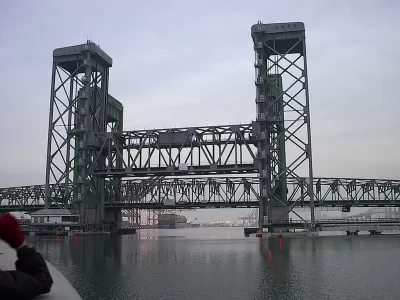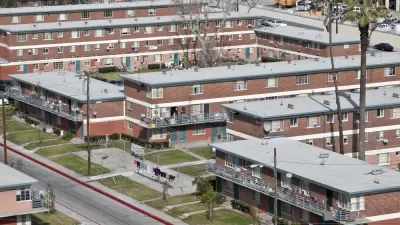Brookings provides a manifesto, of sorts, to suggest an entirely new path forward on infrastructure policy.

Adie Tomer, Joseph W. Kane, and Lara Fishbane write on the continued sluggishness of change on infrastructure policy at the federal level, three years after a presidential election in which both parties made the issue a central point in campaign platforms.
Now, just one year away from another presidential election, the federal government is no closer to wholesale infrastructure reform than it was in 2016. What went so wrong?
The trio of writers suggests that politics was not the problem. The reason was a failure to commit to a process of legal reform.
To enact genuine reform—legislation that completely reshapes the government’s approach to infrastructure programming, funding, and regulation—federal leaders must be willing to revisit the fundamental goals the country’s infrastructure systems intend to achieve and honestly assess whether current policies share those objectives.
The current system is built on obsolete foundations—connecting across straight lines, telephone cable service, and sewage dumping—according to the article. The challenges of today and the future include "the most extreme income and wealth inequality since the Gilded Age, economic divergence caused by digitalization and global trade, the existential pressures of climate change," and will require different policies.
Here is how the article summarizes the key recommendation about how Washington can accomplish progress on infrastructure policy:
To maximize value from existing infrastructure systems and strategically prioritize future improvements, the federal government must adopt a new set of economic, social, and environmental goals. Our federal leaders and their state, local, and civic collaborators must be willing to rebuild our policies from the ground up, designing new approaches where it makes sense and keeping those legacy programs that still respond to today’s challenges.

Planetizen Federal Action Tracker
A weekly monitor of how Trump’s orders and actions are impacting planners and planning in America.

San Francisco's School District Spent $105M To Build Affordable Housing for Teachers — And That's Just the Beginning
SFUSD joins a growing list of school districts using their land holdings to address housing affordability challenges faced by their own employees.

The Tiny, Adorable $7,000 Car Turning Japan Onto EVs
The single seat Mibot charges from a regular plug as quickly as an iPad, and is about half the price of an average EV.

With Protected Lanes, 460% More People Commute by Bike
For those needing more ammo, more data proving what we already knew is here.

In More Metros Than You’d Think, Suburbs are Now More Expensive Than the City
If you're moving to the burbs to save on square footage, data shows you should think again.

The States Losing Rural Delivery Rooms at an Alarming Pace
In some states, as few as 9% of rural hospitals still deliver babies. As a result, rising pre-term births, no adequate pre-term care and "harrowing" close calls are a growing reality.
Urban Design for Planners 1: Software Tools
This six-course series explores essential urban design concepts using open source software and equips planners with the tools they need to participate fully in the urban design process.
Planning for Universal Design
Learn the tools for implementing Universal Design in planning regulations.
Smith Gee Studio
City of Charlotte
City of Camden Redevelopment Agency
City of Astoria
Transportation Research & Education Center (TREC) at Portland State University
US High Speed Rail Association
City of Camden Redevelopment Agency
Municipality of Princeton (NJ)





























